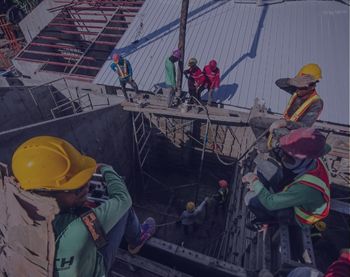The Role of Civil Engineering in Nigeria’s Urban Development
Urban development in Nigeria is accelerating at a remarkable pace, driven by population growth, economic expansion, and an increasing demand for modern infrastructure. At the heart of this transformation is civil engineering—a discipline that plays a foundational role in designing, constructing, and maintaining the infrastructure that keeps cities functional, connected, and sustainable.
This blog explores how civil engineering shapes Nigeria’s urban future, with a focus on roads, bridges, and public infrastructure.

1. Building and Expanding Road Networks
One of the most visible contributions of civil engineering to urban development is the creation of reliable road networks. In Nigeria’s growing cities, roads are not just conduits for cars—they are economic lifelines. Civil engineers design and oversee the construction of highways, expressways, and feeder roads that connect residential areas with business hubs, industrial zones, and rural communities.
From site analysis to pavement design and drainage planning, engineers ensure roads are durable, weather-resistant, and capable of handling increasing traffic volumes. As Nigeria pushes for smarter cities, the integration of intelligent transport systems is also beginning to shape new road designs.
2. Designing and Constructing Bridges
Bridges are critical elements in urban connectivity, particularly in areas divided by rivers, valleys, or other natural barriers. Civil engineers are responsible for designing safe, structurally sound bridges that link communities and reduce travel times.
In flood-prone or densely populated cities like Lagos, Port Harcourt, and Abuja, bridges are essential for both transportation and disaster preparedness. Whether it’s a pedestrian bridge, a flyover to ease congestion, or a large-scale suspension bridge, civil engineers ensure that each structure meets safety codes, load requirements, and environmental standards.
3. Urban Drainage and Flood Management
With the rise in urban population comes a surge in stormwater runoff, often overwhelming cities with poor drainage systems. Civil engineers play a key role in designing effective urban drainage infrastructure to manage flooding, protect buildings, and ensure road usability year-round.
Projects may involve laying underground drain networks, constructing open concrete channels, or designing floodplains and retention basins. The long-term goal is always the same: to protect lives, property, and city operations from the costly disruptions caused by urban flooding.
4. Enhancing Public Utilities and Infrastructure
Civil engineering also contributes significantly to the development of public infrastructure—such as water supply systems, sewage treatment, public transportation terminals, and parks. Engineers design and manage the construction of pipelines, reservoirs, pumping stations, and treatment plants that support daily life and promote environmental sustainability.
In major cities, the expansion of these systems is vital to reducing water shortages, improving sanitation, and enhancing quality of life. With urban populations projected to continue growing, sustainable civil engineering solutions are becoming even more crucial.
5. Ensuring Compliance and Structural Integrity
Urban growth demands not only speed but also safety. Civil engineers ensure that all construction projects comply with national building codes, environmental regulations, and zoning laws. This oversight helps prevent structural failures, reduces maintenance costs, and increases the longevity of urban assets.
In addition, civil engineering professionals conduct geotechnical surveys, structural analyses, and material testing to ensure that every project stands on solid ground—literally and figuratively.
6. Supporting Economic Growth and Employment
Beyond physical infrastructure, civil engineering drives economic development by enabling trade, improving logistics, and creating jobs. The construction and maintenance of roads, bridges, and utilities attract investments, facilitate the movement of goods and people, and support industries such as real estate, manufacturing, and tourism.
By participating in public and private sector projects, civil engineers contribute directly to Nigeria’s GDP and help lay the foundation for sustainable urban economies.
Conclusion
Civil engineering is more than just brick and mortar—it’s the backbone of urban development in Nigeria. From roads and bridges to drainage systems and public utilities, civil engineers play a central role in shaping the physical and economic landscape of our cities.As Nigeria continues to urbanize, the demand for skilled civil engineering professionals will only grow. With a focus on innovation, sustainability, and resilience, the civil engineering field will remain vital to building cities that are not only functional but also future-ready.






